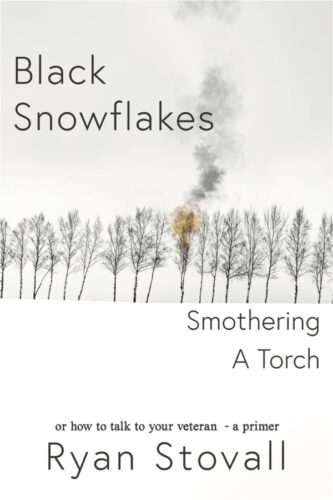A first book of poetry by U.S. Army veteran Ryan Stoval is titled “Black Snowflakes Smothering a Torch: How to Talk to Your Veteran – A Primer”.
In order to facilitate dialogue, between those who have experienced the crushing arms of war and those who have not, at its foundation Black Snowflakes presupposes that many issues veterans face when reintegrating originate not from war trauma but from the hypocrisies inherent to American civilian culture itself.

It’s a quick read and I’ve found many pithy and moving pieces about a struggle to make sense of life-changing moments when forced into sharp contrast. The pages are often processing polarity or managing binary/dichotomous survival decisions, which should resonate deeply with anyone who thinks deeply about the grey scales of risk.
If nothing else, it’s a philosophical journey through some of the pain and remorse of being forced into high-stakes high-speed context switching.
For example I allowed myself time to pause to think about a “Cheerios” reference in a poem titled “American Weddings”, which only amplified the clarion call that comes next through his vision.
Were was your wedding? When? Any airstrikes?
That’s a great example to me of how directly and quickly he will deliver contrast, repaint a picture.
Perhaps an even better example of such polarity and switching is a piece called “But By The Grace of Poor Weapons Maintenance”.
It opens with a narrative like “I hesitate, thinking here is surely one of ours” and then, in “an instant” flips the narrative to…
Well, you can probably guess the “horrified” inverse when the inevitable battlefield identity switch is flipped into someone NOT being “one of ours”.
Related:
Soldatenlieder Der Einsame Posten of 1865, classic poem with a battlefield identity switch.
Also, the anti-war poetry of War Pigs
SPIN: For some reason in “War Pigs,” it always bothered me that you rhymed “generals in their masses” with “just like witches at black masses.” Why use “masses” twice? Did you try to think of a different word?
Butler: I just couldn’t think of anything else to rhyme with it. And a lot of the old Victorian poets used to do stuff like that — rhyming the same word together. It didn’t really bother me. It wasn’t a lesson in poetry or anything.